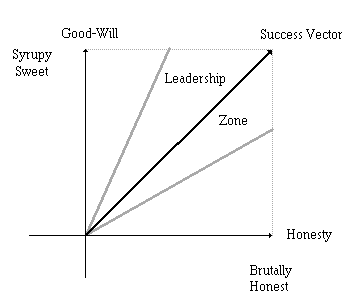![]()
I've been on lots of projects, and some were very high-tech. When suddenly assigned as engineering manager for a support team on a very large and complex electronics and software development project, I wondered if I would be able to assimilate the technology quickly enough to add value. After three months, I learned a lesson I'd learned before. No matter how technically advanced a project is, the hard part is not the technical part, it is the people part.
Projects need special people skills since they often involve people with conflicting priorities and high stress. It helps in such projects to have some reliable principles to rely on in dealing with people issues. Project leadership, especially in a matrix organization, requires that the project manager build informal relationships with the members of the project team. About 30 years back, when I had just started going with a new girlfriend, a professor told me that relationships are built through communication and consideration. Now whenever I want to build a relationship, I consciously look for ways to increase the communication and consideration I am putting in that relationship.
Project environments sometimes require a great commitment to truth, and this is sometimes difficult to reconcile with the interpersonal demands of getting along. Such demanding environments call for the application of sound spiritual principles. Here is one such principle that I have found useful in project work.
I started thinking about this last year when reading the Bible from the beginning. I watched carefully to see the emergence of the spiritual message as it evolved from the first stage of spiritual discipline and obedience and then gradually grew to a larger sense of the spiritual principles of goodness. I was interested to see that some advanced spiritual principles appeared quite early in the text.
I was struck by the phrase "kindly and truly" that appears several times in early books of the Bible. Even four thousand years ago, it was deemed by some a worthy standard to deal with each other kindly and truly.
It seems we have not always remembered the simple practicality of dealing with one another in this way. We often hear people justifying their positions by saying, "Well, I was just brutally honest. I told them just the way it is. I can't lie." And they think this is somehow a recipe for success. It turns out that honesty and good-will need to be balanced together to bring success to our dealings with others.
Our practice of truth and love go together. Our love isn't really love if it isn't true. And the truth doesn't have the positive affect we want unless it is also loving. I learned a few years back that being brutally honest can be, well, how do I put this - an act of brutality?
Someone once said, "I want neither unloving critics nor uncritical lovers." That reflects the reality that truth and love need to go hand in hand. We value honesty as an ethical principle, but we need to couple honesty with good will. If we have only honesty without good-will, we simply end up as a "whistle-blower" in our organization or as an abrasive "Chicken Little." This may be ethical in one sense, but it is not the sign of a healthy, progressive organization. Success is achieved when we make sure our honesty is balanced with good will and that our good will is really true. Only in the combination of these we can make real progress.
 You might think of these
two forces as vectors, and the success vector is the resultant of good-will and honesty
exercised in balance (as shown in the figure). It is not our exercise of one or the other,
simply trying to be nice to people or being brutally honest, but the vector sum of these
two factors that is a solid principle for success. The resultant vector is a cross-product
of honesty and good-will. There is a good reason for calling this a cross-product, since
while either one by itself may be relatively easy, increasingly exercising the two in
balance can be a real struggle.
You might think of these
two forces as vectors, and the success vector is the resultant of good-will and honesty
exercised in balance (as shown in the figure). It is not our exercise of one or the other,
simply trying to be nice to people or being brutally honest, but the vector sum of these
two factors that is a solid principle for success. The resultant vector is a cross-product
of honesty and good-will. There is a good reason for calling this a cross-product, since
while either one by itself may be relatively easy, increasingly exercising the two in
balance can be a real struggle.
These spiritual principles can be communicated in the work place by simply holding up the standard of honesty and good will, dealing with one another kindly and truly, and best of all, by acting this out ourselves. I will be glad to share with you a few stories about how this can be used in the workplace.
![]()
Return to: Project Home.
© Copyright 1997, 2001, James R. Chapman. All rights reserved.